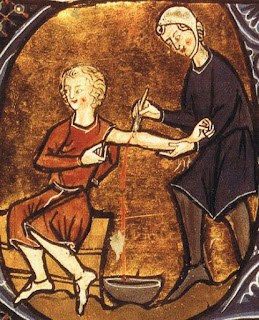Another dilemma for Christian Europeans in the Middle Ages was the idea that Jews were not to be fraternized with, and yet they were often the best physicians. One example of this was mentioned here, Jacob Mantino ben Samuel (died 1549).
Jacob's family was from Tortosa, Spain, but were forced to flee in 1492 because of the Alhambra Decree. Jacob studied medicine at Padua and Bologna, staying in Bologna to set up his practice. His translations of scientific works from Hebrew to Latin brought him to the attention of the court of Pope Clement VII. War in 1527 (between the Holy Roman Empire and Protestants) caused him to settle in Verona, where the Catholic bishop protected him. When the bishop went to Rome, however, Jacob left Verona and settled in Venice.
Jacob had many influential clients: ambassadors from France and England, papal dignitaries, and other wealthy local patrons. Despite medieval culture's antipathy toward Jews, his clients made an appeal to Venice's ruling Council of Ten. The appeal—which was granted—was to exempt Jacob from wearing the yellow that was intended to denote Jews in public. Originally this was temporary, but later was made permanent.
Jacob later went to Rome, acquiring great influence and becoming personal physician to Pope Paul III in 1534. In 1544 he returned to Venice, where once again he was exempted from wearing yellow. Accompanying the Venetian ambassador to Damascus, he died in 1549.
Why was he exempted from wearing yellow? Was it a desire on the part of his clients to not be seen associating with a Jew? Or was it for a slightly more kind-hearted reason: they understood the insult of being forced to wear yellow and wanted to spare the feelings of a man they had come to respect? Perhaps a little of both. He was not unique in the Middle Ages: Jewish doctors and Jewish medicine were regarded very highly. We'll delve into that a little more deeply tomorrow.

No comments:
Post a Comment
Note: Only a member of this blog may post a comment.